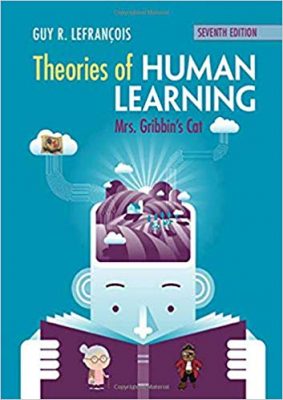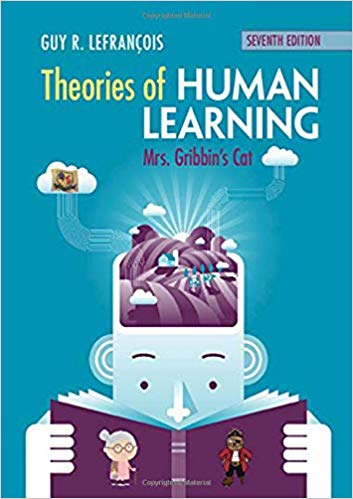 Author: Guy R. Lefrancois
Author: Guy R. Lefrancois
Publisher: Cambridge University Press – 547 pages
Book Review by: Sonu Chandiram
This being the seventh (2020) edition of this book, with the first edition published in 1972, I was curious to learn why it has been so popular for nearly 50 years. So I checked its ranking on Amazon, but there was no ranking to be found.
If you want to know the reason for the popularity, persistence, and longevity of this book, having gone through six revisions, you will find the answer in the Preface of the printed book.
Preface: “Read this first…not just because it’s at the beginning of the book but because if you don’t, you might wonder what the devil is going on. Let’s get right to the point. I didn’t write this book. Truth is, the first edition was a report written and given to me by Kongor, a behavioral scientist from well, it doesn’t really matter in any case…”
- Part I – Science and Theory
- Human Learning
- Part II – Mostly Behavioristic Theories
- Early Behaviorism: Pavlov, Watson, Guthrie
- The Effects of Behavior; Thorndike and Hull
- Operant Conditioning: Skinner’s Radical Behaviorism
- Evolutionary Psychology: Learning, Biology, and the Brain
- Part III – The Beginnings of Modern Cognitivism
- Transition to Modern Cognitivism: Hebb, Tolman, and the Gestaltists
- Part IV – Mostly Cognitive Theories
- Three Cognitive Theories: Bruner, Piaget, and Vygotsky
- Learning and Memory
- Motivation and Emotions
- Social Learning: Bandura’s Social Cognitive Theory
- Machine Learning and Artificial Learning: The Future?
- Part V – Summary
- Summary, Synthesis, and Integration
Here is what’s new in this seventh edition, according to the editor:
“This seventh edition is a survey and interpretation of some of the important theories and findings in the psychology of learning. It includes a detailed examination of the main behavioristic and cognitive theories and an appraisal of each, together with a discussion of its most important practical applications, especially in education. Also, it looks at the most recent and useful models of memory, motivation, social / cognitive learning, and current brain-based research, and it explores recent and rapidly changing progress in the field of machine learning and artificial intelligence. Like its predecessors, this edition continues to emphasize relevance and practical implications of topics, clarity of presentation, and maintenance of high interest. The seventh edition reflects a significant updating of research, theory, in all areas, including:
- Highlighting recent developments in, and applications of brain-based research
- Describing newer models in motivation theory and their implications
- Summarizing current models of memory and related implications for theories of learning
- Exploring the importance of technology for simulating human cognitive processes and suggesting new models of learning
- Examining the effects of screen violence on children and adults, and
- Looking at what machines capable of deep learning and artificial intelligence behaviors might mean for the future
Who can most benefit from this book?
They are (in alphabetical order): counselors, dentists, engineers, environmental activists, farmers, fishermen, glass blowers, grandfathers and grandmothers, housewives, industrial psychologists, judges, lawyers, numismatists, nurses, philatelists, philosophers, physicians, plasma physicists, poets, quantum physicists, retired types, social psychologists, social workers, spelunkers, stockbrokers, students of human learning, teachers, tree planters, vagabonds, and just about all others interested, but not specified here.
In summary, human learning is all pervasive in the course of anyone’s life and it never stops. This fact-, findings-, and research-based book on how humans learn, particularly how best we learn, is extremely useful to all those who want to improve their lives. And who doesn’t?
Author:
Guy R. Lefrancois is Honorary Professor in the Department of Educational Psychology at the University of Alberta in Edmonton, Canada. He has published over 50 titles, including a number of best-selling textbooks in their respective fields.







